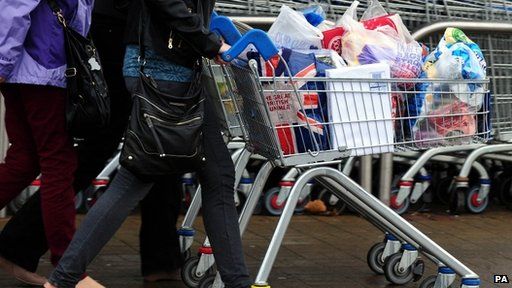Tesco shares drop on profit warning
- Published

Shares in Tesco reached an 11-year low after the firm cut its full-year profit forecast to £2.4bn from £2.8bn.
In a statement, the supermarket said the "challenging trading conditions" would affect the group's financial performance. Sales have been sliding and it has been losing market share.
The start date for the new chief executive Dave Lewis has been brought forward to Monday.
The half-year dividend has also been slashed by 75% compared with last year.
Tesco said it anticipated a dividend of 1.16p per share. This represents a saving to the company of about £600m.
In addition, Tesco said it would cut costs. Spending on the business for the current financial year will be no more than £2.1bn, which is £400m less than planned and £600m less than last year. IT will be affected and plans to refurbish its stores will be slowed.
Market share
"The Board's priority is to improve the performance of the Group. We have taken prudent and decisive action solely to that end," said chairman Sir Richard Broadbent.
"The actions announced today regarding capital expenditure and, in particular, dividends have not been taken lightly. They are considered steps which enable us to retain a strong financial position," he added.
Tesco shares plunged 7.2% to close at 228.70p. Other supermarkets - Sainsbury's and Morrisons - also fell sharply as investors feared an industry-wide price war.
Shares in Tesco are down 31% so far this year and down 41% since former chief executive Terry Leahy left the firm.
Current chief executive Philip Clarke agreed to stand down last month.
He had been trying to revive Tesco's fortunes through a £1bn turnaround plan, but a trading update in June showed a 3.7% fall in like-for-like sales, which he admitted were the worst figures for decades.
Figures published on Wednesday from the consumer research firm Kantar Worldpanel show Tesco sales fell 4% in the 12 weeks to 17 August - the largest slide of the big four supermarkets. Its market share fell to 28.2% compared to 30.2% a year ago.
Analysis: Kamal Ahmed, BBC business editor
By trying to be all things to all people, Tesco is in danger of becoming not quite enough for nowhere near enough people.
The retailer must hope that this is no more than a major reset of profit expectations after the heady days of Sir Terry Leahy.
Under that scenario, plunging profits will stabilise and then run at lower, but predictable levels.
The great fear must be that the UK's biggest retailer has lost its way more fundamentally and that cutting dividends and reducing the amount it spends sprucing up its shops are sticking plasters over an "everything, everywhere" strategy that is simply past its sell-by date.
'On the rack'
In his new position, Mr Lewis, formerly an executive at Unilever, has been told to review all aspects of the business "in order to improve its competitive position".
Clive Black, a retail analyst at Shore Capital Stockbrokers, said: "We expect, as part of a range of measures, considerable senior management change under Mr Lewis, as Tesco needs a world-class top team to take it forward."
"A dividend cut of this degree underlines the extent of the problems Tesco is facing," said Phil Dorrell, director of consultants Retail Remedy. "Throw in the fact that Dave Lewis is being parachuted in a month early and you have a grocer that is truly on the rack.
"What's certain is that we won't be seeing a rapid turnaround," he added.
"Tesco took its eye off the ball in the UK to fund overseas businesses and is paying the price today," said retail analyst Rahul Sharma. It exited the US in 2013, after continued losses at its "Fresh and Easy" brand, and left Japan in 2012 .
Another analyst said Tesco's main problem was customer satisfaction.
"It started declining before Terry Leahy left as CEO due to underinvestment in staff and stores and continued throughout Phil Clarke's tenure, reaching record lows today," said Marc de Speville, founder of the supermarket consultancy Strategic Food Retail.
Tesco - what went wrong?
- Started losing ground in 2011
- Left US and Japan after failed ventures
- Losing market share to discount retailers Lidl and Aldi
- On the upmarket end of the spectrum, faces stiff competition from Waitrose
- Published27 August 2014
- Published21 July 2014
- Published4 June 2014